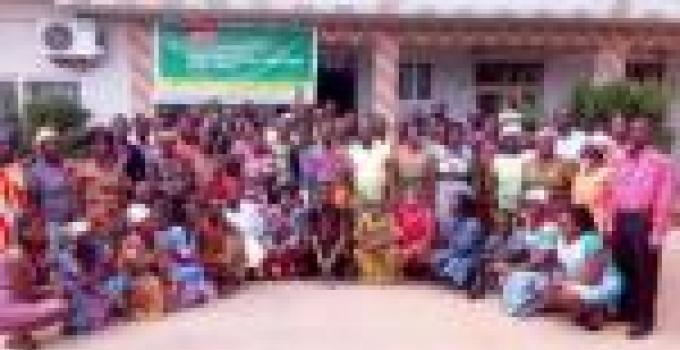The Roots and Tuber Value Chain Project, a DANIDA sponsored Project, has organized a 5-day intensive training programme for stakeholders as part of its core outreach and dissemination activities. The programme, which was held from 22nd – 27th August 2016 at three separate venues across the country, attracted key actors along the value chains of the main root and tuber crops in Ghana (cassava, yam, cocoyam and sweetpotato). The workshop brought together players and stakeholders such as farmers, retailers, wholesalers, processors, extension officers and researchers to facilitate knowledge sharing and capacity building for the holistic benefit of the root and tuber subsector.
The ‘Stakeholders Training Programme’ was organized at three venues to cover the target areas under the project. The Southern sector workshop was held at Nsuta in the Ashanti Region with stakeholders coming from Mampong, Asunafo North and the Asante Akyem South districts. The second, which is the Northern outreach was held at Walewale in the Northern Region and the final programme was held at Oforikrom near Techiman in the Brong Ahafo Region of Ghana. The programme comprised of sessions where facilitators trained participants via presentations, on marketing, value chains and rural entrepreneurship; records keeping and financial management; best agronomic practises for root and tuber crops, postharvest handling and value addition.
In his welcome address, Dr. Robert Aidoo, the lead investigator of the project and a senior lecturer at the Department of Agricultural Economics, Agribusiness and Extension-KNUST noted that, the root and tuber subsector is one of the most significant sectors within Ghana’s agricultural space offering employment to about 55 percent of farmers alongside many women processors and traders who depend on these crops for their livelihoods. He explained that part of the objectives of the ‘Strengthening Root and Tuber Value Chain Project’ in Ghana is to contribute knowledge and capacity to actors along the root and tuber value chains especially women in order to improve livelihoods. He emphasized the need for all actors in the commodity value chain to work together in order to gain competitive advantage and high returns on their investments while focusing on customer satisfaction.
Dr. Faustina Wireko-Manu, a senior lecture at the Department of Food Science and Technology-KNUST and a member of the project team, presented on storage and postharvest issues of root and tuber crops. The participants were also exposed to the current best agronomic practises (pre-planting, post-planting and harvesting) for roots and tuber production in an interactive presentation by Dr. Allen Oppong from the Crops Research Institute (CSIR-CRI).
Also, there were dedicated sessions for hands-on practical training of participants on how to make high quality flour from cassava, cocoyam, yam and sweetpotato. More importantly, the practical training sessions were aimed at building the capacity of stakeholders to have alternative sources of employment and revenue for an enhanced livelihood particularly for the young and unemployed women. Participants were further trained on how to make products like cakes, biscuits, chips, meat pies, macaronni, wasawasa, koose, etc. from the different root and tuber-wheat composite flour. These sessions were facilitated by Dr. Faustina Wireko-Manu and Mrs. Matilda Ayirebi Danso from the Women in Agricultural Development (WIAD) Directorate of the Ministry of Food and Agriculture, Ghana. In all, the workshop attracted over 190 participants.

